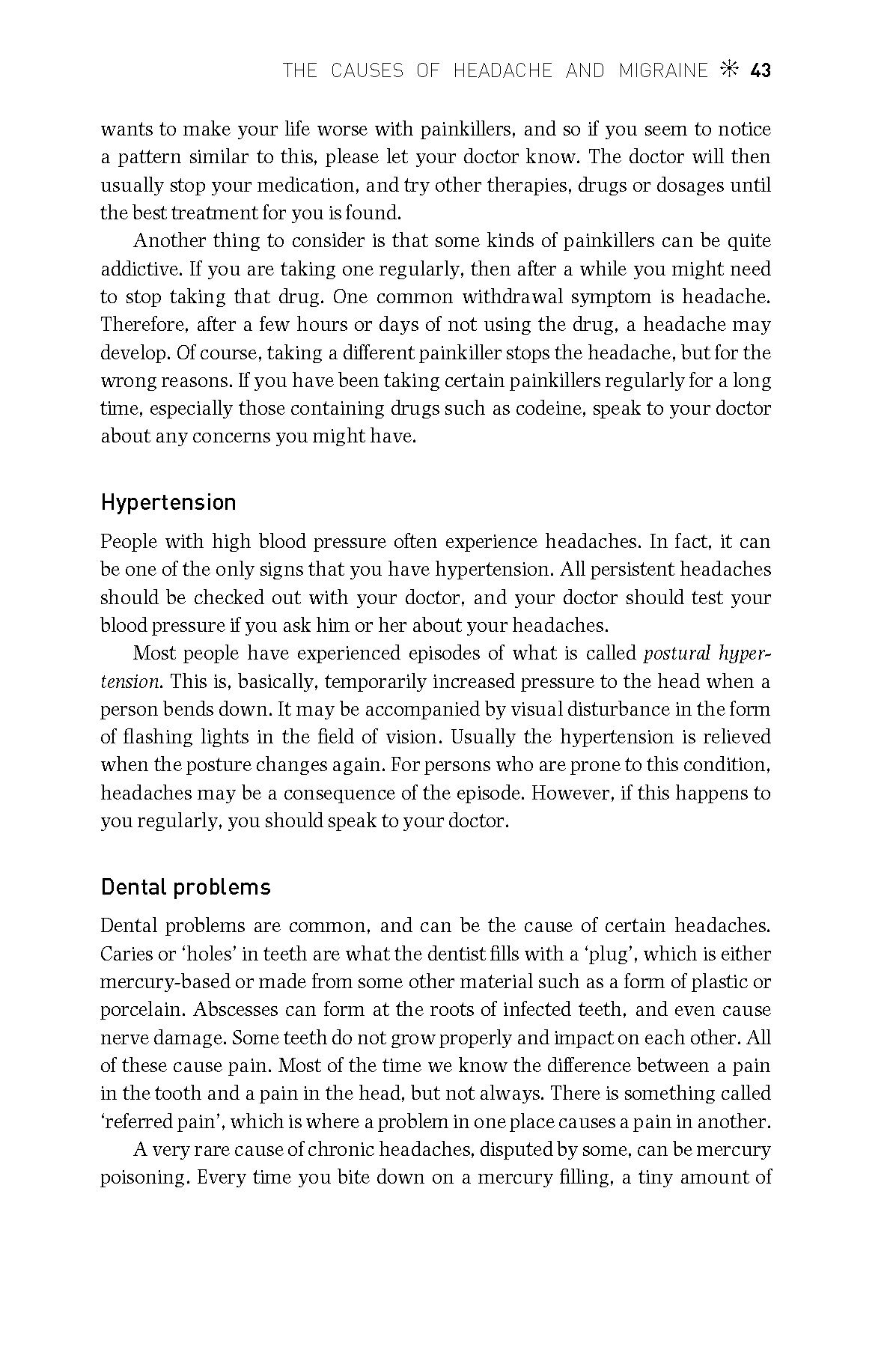UHAM060

THE CAUSES OF HEADACHE AND MIGRAINE ^ U2
wants to make your life worse with painkillers, and so if you seem to notice a pattern similar to this, please let your doctor know. The doctor will then usually stop your medication, and try other therapies, drugs or dosages until the best treatment for you is found.
Another thing to consider is that some kinds of painkillers can be ąuite addictive. If you are taking one regularly, then after a while you might need to stop taking that drug. One common withdrawal symptom is headache. Therefore, after a few hours or days of not using the drug, a headache may develop. Of course, taking a different painkiller stops the headache, but for the wrong reasons. If you have been taking certain painkillers regularly for a long time, especially those containing drugs such as codeine, speak to your doctor about any concerns you might have.
Hypertension
People with high blood pressure often experience headaches. In fact, it can be one of the only signs that you have hypertension. Ali persistent headaches should be checked out with your doctor, and your doctor should test your blood pressure if you ask him or her about your headaches.
Most people have experienced episodes of what is called postural hypertension. This is, basically, temporarily increased pressure to the head when a person bends down. It may be accompanied by visual disturbance in the form of flashing lights in the field of vision. Usually the hypertension is relieved when the posturę changes again. For persons who are prone to this condition, headaches may be a conseąuence of the episode. However, if this happens to you regularly, you should speak to your doctor.
Dental problems
Dental problems are common, and can be the cause of certain headaches. Caries or ‘holes’ in teeth are what the dentist hlls with a ‘pług’, which is either mercury-based or madę from some other materiał such as a form of plastic or porcelain. Abscesses can form at the roots of infected teeth, and even cause nerve damage. Some teeth do not gro w properly and impact on each other. Ali of these cause pain. Most of the time we know the difference between a pain in the tooth and a pain in the head, but not always. There is something called ‘referredpain’, which is where a problem in one place causes a pain in another.
A very rare cause of chronic headaches, disputed by some, can be mercury poisoning. Every time you bite down on a mercury hlling, a tiny amount of
Wyszukiwarka
Podobne podstrony:
UHAM062 THE CAUSES OF HEADACHE AND MIGRAINE ^ 45 genuinely intense, or if it is accompanied by other
UHAM066 THE CAUSES OF HEADACHE AND MIGRAINE ^ U9 Two of the most common headache-causing foods are c
UHAM068 THE CAUSES OF HEADACHE AND MIGRAINE ^ 51Diabetes Headaches can result from diabetes, because
UHAM064 THE CAUSES OF HEADACHE AND MIGRAINE ^ Ul However, the best method of avoiding it is consider
UHAM056 THE CAUSES OF HEADACHE AND MIGRAINE ^ 39 As a conseąuence, you become morę and morę dehydrat
UHAM070 THE CAUSES OF HEADACHE AND MIGRAINE * 53 HELPFUL TIPSHELPFUL TIPS! HELPFUL TIPS! HELPFUL Tak
UHAM058 THE CAUSES OF HEADACHE AND MIGRAINE * 41 Torelli, Cologno and Manzoni (1999) investigated we
UHAM072 THE CAUSES OF HEADACHE AND MIGRAINE ^ 55 something similar, andwemayevenhavehadaheadache aft
UHAM054 4The causes of headache and migraineIn this chapter, some of the common and rare causes
UHAM037 20 * UNDERSTANDING HEADACHES AND M IG RAI N ES episodes in Life and the onset of a headache.
UHAM079 62 * UNDERSTANDING HEADACHES AND M IG RAI N ESPoints to notę • The consequ
UHAM014 About this book In the first chapter, the differences between headaches and migraines are ou
więcej podobnych podstron